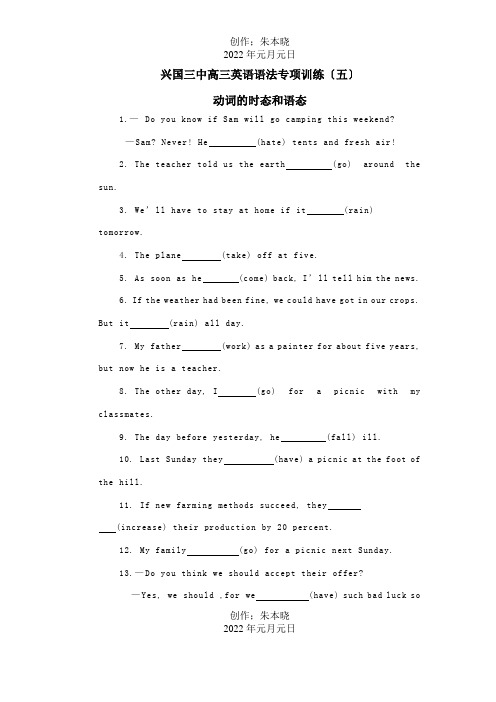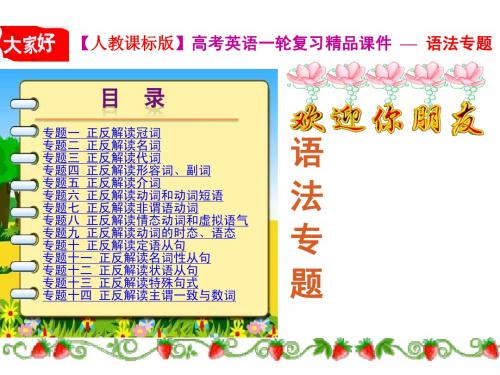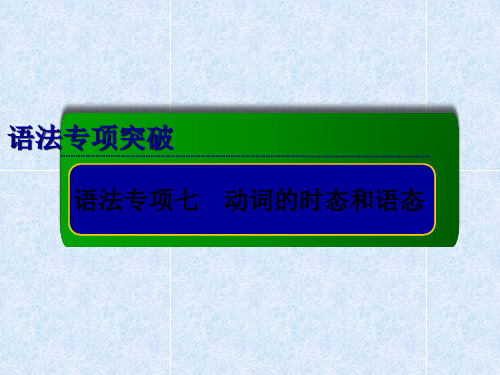2014届高三英语大一轮复习讲义 语法知识 专题五 动词的时态和语态 新人教版
人教版高考英语大一轮复习专用讲义: 专题五 动词的时态与语态

专题五动词的时态与语态一般时态一般时态一般现在时一般过去时分别表示现在、过去的经常性、习惯性动作或存在的状态一般将来时表示将来某一时刻的动作或状态,或将来某一段时间内经常发生的动作或存在的状态过去将来时表示从过去某一时间看将要发生的动作所谓一般时态,表示既不“进行”,又不“完成”。
We have meals three times a day.我们一日吃三餐。
(现在的习惯)He is always ready to help others.他总是乐于助人。
(现在的状态)When I was a boy, I often went to play in that park.我小时候常去那个公园玩。
(过去的习惯)1.一般现在时(1)一般现在时的构成一般现在时主要用动词的原形表示,如果主语为第三人称单数,则一般在动词原形后加-s或-es,其变化规则如下表所示:情况规则例词一般情况加-s helps, eats, rises, reads以-s, -sh, -ch, -x, -o结尾的动词加-es discuss→discusses teach→teaches以辅音字母加y结尾的动词变y为-ies carry→carries fly→flies(2)一般现在时的用法一般现在时除了可以表示现在的经常性、习惯性动作或存在的状态外,还可表示:①客观真理、科学事实及自然现象。
此用法即使出现在过去语境中,也用一般现在时。
The sun rises in the east.太阳从东方升起。
②用于here, there开头的倒装句中,一般现在时表示现在正在发生的动作或存在的状态。
There goes the bell.铃响了。
Here comes the bus.公共汽车来了。
2.一般过去时(1)一般过去时的构成一般过去时用动词的过去式表示,其规则动词变化方法如下表所示:(2)一般过去时的用法一般过去时除了可以表示过去经常性、习惯性的动作或存在的状态外,还有以下用法:①want, hope, think, intend等动词的一般过去时往往表示“过去原……”之意。
高考英语统考一轮复习 第五章 动词的时态参考课件 新人教版

三、将来进行时(will be doing) 将来进行时表示在将来的某个具体时间或某一段时间内正在发生的动作 或事情。 Don't worry. You won't miss her. She will be wearing a red T-shirt and a white skirt at that time. 不用担心, 你不会错过她。那时她会穿着红T恤 衫和白裙子。 1. 【翻译】 我不能通过电视看演唱会, 因为那时我在做作业。 I won't be able to watch the concert on TV because I _w_i_ll_b_e__p_la_y_i_n_g__ (play)basketball at that time.
二、过去进行时(was/were doing) 过去进行时表示在过去一个比较具体的时间或某一段时间内正在发生的 动作, 如: Mary was listening to light music 10 minutes ago. 玛丽十分钟前在听轻音乐。 1. —I didn't see your brother at the party last night. —Hew_a_s__d_o_in__g(do) his homework at home.
2. 现在进行时与always, often, forever, constantly 等频度副词连用, 表示 反复发生的动作或持续存在的状态, 往往带有说话人的主观色彩, 如 “sb. be always doing”表示说话人的一种赞扬或埋怨的语气。如: You are always changing your mind. 你老是改变主意。 He is always helping the old and children. 他总是帮助老人和小孩。
2014高考英语动词时态语态复习课件公开课

【注意】 一般情况下,下面4类动词无进行时态:
(1)表心理状态、情感的动词:like, love, hate, care, remember, believe, want, mind, wish, agree, mean, need。
(2) 表存在的状态动词:have, appear, exist, lie, remain, seem, belong to, depend on。
(3) 瞬间动词:begin/start, allow, accept, permit, promise, admit, complete。
(4)感官动词:see, hear, notice, feel, smell, sound, taste, look。
第15页,共66页。
Tips:
现在进行时的标志: Now, right now, at this moment, look,
Dear editor, As the college entrance examination is drawing near, we
senior high school students are occupied with busy work. To a certain extent, PE class is our only chance to relax and enjoy
now, lately/recently, in/during/over the last/past …, since…, for … 等.
He __h_a_s_l_iv_e_d__ (live) in Guiyang over the past
6 years.
第20页,共66页。
高考英语一轮复习英语语法专题复习:时态和语态课件

语法知识
英语语法框架
音素★
语音 词法
音节 五种语音现象★ 九大词类 动词★ 词汇搭配 八种句子成分
时态 两大语态 三类非谓语动词
四类句子
句法
五种简单句
并列句
名词性从句
复合句★ 定语从句
特殊句式★ 状语从句
主谓一致
CONTENTS
时态与语态
• 一般时态 • 进行时态 • 完成时态 • 完成进行时态 • 主动语态 • 被动语态
now
future
将来完成进行时 will/shall have been doing
• 动作在某种情况下一直持续到将来某个时间仍未结束。 By the end of this year he will have been acting for thirty years.
将来进行时态
用法: ① 将来某个时间正在进行的动作,或会延续到将来的动作
What will you be ① 常和时间状语then, at that time/moment等连用。
语态是通过动词的变化表现出来的。
doing
at
this
time
next
Monday.
表示将来某个时间要发生的动作或存在的状态。
B. takes
C. is taking
D. has taken
B off at
【解析】考查时态。飞机、火车等按时刻表运行,表达时用一般现 在时表示将来。
一般过去时
(1) 表示过去某个时间发生的动作。 He proposed to Sarah on their annivesary.
(2) 过去某段时间的状态。 I loved him.
高三英语一轮复习 语法专练五动词的时态和语态

兴国三中高三英语语法专项训练〔五〕动词的时态和语态1.— Do you know if Sam will go camping this weekend?—Sam? Never! He (hate) tents and fresh air!2. The teacher told us the earth (go) around the sun.3. We’ll have to stay at home if it (rain) tomorrow.4. The plane (take) off at five.5. As soon as he (come) back, I’ll tell him the news.6. If the weather had been fine, we could have got in our crops. But it (rain) all day.7. My father (work) as a painter for about five years, but now he is a teacher.8. The other day, I (go) for a picnic with my classmates.9. The day before yesterday, he (fall) ill.10. Last Sunday they (have) a picnic at the foot of the hill.11. If new farming methods succeed, they(increase) their production by 20 percent.12. My family (go) for a picnic next Sunday.13.—Do you think we should accept their offer?—Yes, we should ,for we(have) such bad luck so创作;朱本晓2022年元月元日far, and time (run) out.14. Unless it (rain), we’ll go for a picnic next Sunday.15. Ladies and gentlemen, please fasten your seat belts. The plane (go) through a cloud.16. We were about to leave school it began to snow.17. If you (win) the game, you will have to train hard.18. I’ll take my umbrella in case it (rain).19. Listen! The girl (play) the piano in the next room.20. Look! They (swim) in the lake.21. When I got home, Mum (cook) lunch in the kitchen.22.—I saw Ann at the concert yesterday.—Impossible. She (play) chess with me in my room then.23.—Why did you go to watch the diving competition yesterday?—My brother (play).24. At two o’clock yesterday afternoon, my father(work) in the vegetable garden.25. When they got to the destination, the sun(shine) brightly.创作;朱本晓2022年元月元日26. He said he (return) to his hometown the next month.27.—Lucy, you didn’t come to the ball last night?—I , but I had an unexpected visitor.28. He said they (return) to their motherland in the near future.29. Tom was about to lock the door the phone rang.30. He promised that he (help) me out.31. So far this year we (see) a rise in food prices.32. Since then he (be) in China.33. The construction of the two new railway lines (complete) by now.34. Over the past five years the Greens (plant) thousands of trees on the hill.35. Up to now, he (write) novels.36. By the time I got to school, class(begin).37. The hotel wasn’t particularly good, but I(stay) in many worse hotels.38. By 1980, we (plant) five thousand trees along the road.39. I’m too tried now, for I (work) for about five hours without a break.创作;朱本晓2022年元月元日40. Rio (prepare) for the 2021 Olympic Games in the past few years.41. In the last few months, I (prepare) for the coming examination.42.—Why are you so tried?—I (do) the housework since this morning.43. Since 8 o’clock, Tom (work) in the field.44. No decision (make) about any future appointment until all the members have given their views.45.—What’s the noise?—The machine (repair).46. Up to now, two films (make).47. In recent years two chess clubs (run) to makea profit in my neighbour-hood.48. All the food (eat) up by now.49.—When will the expert come and give the lecture on economic development?—Not until our programme(approve) by the authorities.50. The problem (explain) twice. But I still can’t understand it.51. The project (complete) next month.52. The new house (build) so far.53. My hometown (situate) on the river bank.创作;朱本晓2022年元月元日54. The supermarket (locate) in the centre of the town.55. The water (feel) cold at this time of years.56. The food (taste) good.57. The car (not start) on such a cold day.58. The water (feel) cool when I jumped into the pool for morning exercise.59. Tom is (blame) for the broken window.60. The stamp is well worth (buy). I t’s good value for money.61. My pen (write) well, so I like it very much.62. The war (break) out in 1980.63. Her car needs (wash).64. The cloth (sell) well.65. The reports went missing in 2021 and nobody(see) them since.66. Unless some extra money (find), the theatre will close.67. If we (not act) now to protect the environment, we’ll live to regret it.68. We (leave) very early so we packed the night before.69. “Life is like walking in the snow〞, Granny used to say, “because every step (show).〞创作;朱本晓2022年元月元日70. I had been working on math for the whole afternoon and the numbers (swim) before my eyes.71.—Did you ask Sophia for help?—I (do not) need to-I managed perfectly well on my own.72. The manager (tell) the workers how to improve the programme since 9 a.m.73. Planning so far ahead (make) no sense-so many things will have changed by next year.74. I wasn’t sure if he was really interested or if he(just be) polite.75. When Alice came to life, she did not know how long she(lie) there.76. If you don’t like the drink you(order), just leave it and try a different one.77. Linda, make sure the tables (set) before the guests arrive.78.—Hi, let’s go skating.—Sorry, I’m busy right now. I(fill) in an application form for a new job.79.—What time is it?—I have no idea. But just a minute, I(check) it for you.80. I found the lecture hard to follow because it创作;朱本晓2022年元月元日(start) when I arrived.81. Shakespeare’s play Hamlet(make) into at least ten different films over the past years.82. Hurry up! Mark and Carol (expect) us.83.—So what is the procedure?—All the applicants (interview) before a final decision is made by the authority.84.—Do you think Mom and Dad (be) late?—No, Swiss Air is usually on time.85. George said that he would come to school to see me the next day, but he (not).86.—Have you heard about that fire in the market?—Yes, fortunately no one (hurt).87. Our friendship (develop) quickly over the weeks that followed.88. Experiments of this kind (conduct) in both the U.S. and Europe well before the Second World War.89. Tom (work) in the library every night over the last three moths.90.—That must have been a long trip.—Yeah, it (take) us a whole week to get there.91.—Bob has gone to California.—Oh, can you tell me when he(leave).92. It took me a long time before I was able to fully appreciate创作;朱本晓2022年元月元日what they (do) for me.93. In the spoken English of some areas in the US, the “r〞sounds at the end of the words (drop).94. Is honesty the best policy? We (teach) that it is when we are little.95.—I hear that Jason is planning to buy a car.—I know. By next month he(save) enough for a used one.96. After getting lost in a storm, a member of the navy team(rescue) four days later.97. Did you predict that many students (sign) up for the dance competition?98. The church tower which (restore) will be open to tourists soon. The work is almost finished.99. Every few years, the coal workers (have) their lungs X-rayed to ensure their health.100. We won’t start the work until all the preparations (make).101. The water supply has been cut off temporarily because the workers (repair) one of the main pipes.102. The letters for the boss (put) on his desk but he didn’t read them until three days later.103. In the last few years thousands of films(produce) all over the world.创作;朱本晓2022年元月元日104. On her next birthday, Ann (be) married for twenty years.105. We (work) on this project for four hours. Let’s have a rest.106. James has just arrived, but I didn’t know he(come) until yesterday.107. You’d better write down her phone number before you (forget) it.108. A Midsummer Night’s Dream(open) at the Theatre Royal on 19th June, and then tours throughout Scotland.109. I felt very tired when I got home, and I(go) straight to bed.110. —Kevin, you look worried. Anything wrong?—Well, I (take) a test and I’m waiting for the result.111. Food supplies in the flood-stricken area(run) out. We must act immediately before there’s none left.112. That piece of music sounds quite familiar. Who(play) the piano upstairs?113. Look at the pride on To m’s face. He (seem) to have been praised by the manager just now.114. The place caught fire three times in the last century, and little of the original building (remain) now.115.The book has been translated into thirty languages since创作;朱本晓2022年元月元日it (come) on the market in 1973.116. —How much do you know about the Youth Olympic Games to be held in Nanjing?—Well, the media (cover) it in a variety of forms.117.—What about your self-drive trip yesterday?—Tiring! The road is being widened, and we(have) a rough ride.118.—Could I use your car tomorrow morning?—Sure. I (write) a report at home.119. The president hopes that the people will be better off when he quits than when he (start).120. The manager is said to have arrived back from Paris where he (meet) some European business partners.121.—I hear you (work) in a pub. What’s it like?—Well, it’s very hard work and I’m always tired, but I don’t mind.122.—Tommy is planning to buy a car.—I know. By next month, he (save) enough for a used one.123.—Peter, where did you guys go for the summer vacation?—We (be) busy with our work for months, so we went to the beach to relax ourselves.124.—Why, Jack, you look so tired!创作;朱本晓2022年元月元日—We’ll, I (paint) the house and I must finish the work tomorrow.125. The twins, who (finish) their homework, were allowed to play badminton on the playground.126. I’m calling about the apartment you(advertise) the other day. Could you tell me more about it?127. In order to find the missing child, villagers(do) all they can over the past five hours.128. Walmart, which is one of the largest American supermarket chains, (keep) some of its store open 24 hours on Mondays through Saturdays.129. After school we went to the reading-room to do some reading, only to be told that it (decorate).130.—Tony, why are your eyes red?—I (cut) up peppers for the last five minutes.131. I (come) to visit you later that day, but I had to phone and cancel.132. —Look! Somebody (clean) the sofa.—Well, it wasn’t me. I didn’t do it.133. We arrived at work in the morning and found that somebody (break) into the office during the night.134. Mother wanted to be a good provider, a role she (shoulder) since her marriage to Father.创作;朱本晓2022年元月元日135. During his stay in Xi’an, Jerry tried almost all the local foods his friends (recommend).136. On Monday morning is usually (take) me an hour to drive to work although the actual distance is only 20 miles.137. Jim (watch) a late night film at home when ,right in the middle of a thrilling scene, the television went blank.138. —Can I call you back at two o’clock this afternoon?—I’m sorry, but by then I (fly) to Beijing. How about five?139. His first novel (receive) good reviews since it came out last month.140. I have to see the doctor because I (cough) a lot lately.141. Since the time humankind started gardening, we(try) to make our environment more beautiful.142. Whenever you (buy) a present, you should think about it from the receiver’s point of view.143. Around two o’clock every night, Sue will start talking in her dream. It somewhat (bother) us.144. If nothing (do), the oceans will turn into fish deserts.145. —Have you heard about the recent election?创作;朱本晓2022年元月元日—Sure, it (be) the only thing on the news for the last three days.146.—I don’t understand why you didn’t go to the lecture yesterday afternoon.— I’m so sorry. But I (do) my homework.147. “The moment (come) soon,〞he thought to himself, waiting nervously.148. —I remember you were a talented pianist at college. Can you play the piano for me?—Sorry, I (play) the piano for years.149.—Joan, what (hold) in your hand?—Look! It’s a birthday gift for my grandma.150. In 1492, Columbus (land) on one of the Bahama Islands, but he mistook it for an island off India.151. It is the most instructive lecture that I(attend) since I came to this school.152. In the near future, more advances in the robot technology(make) by scientists.153. I’m tired out. I (shop) all afternoon and I don’t seem to have finished anything.154. This coastal area (name) a national wildlife reserve last year.155. Writing out all the invitations by hand was more time-consuming than we (expect).创作;朱本晓2022年元月元日156. They made up their mind that they (buy) a new house once Larry changed jobs.157.—Oh no! We’re too late. The train (leave).—That’s OK. We’ll catch the next train to London.158. I didn’t think I’d like the movie, but actually it (be) pretty good.159. The manager was concerned to hear that two of his trusted workers (leave).160. After Jack had sent some e-mails, he(start) working on his project.161. When I got on the bus, I (realize) I had left my wallet at home.162. She was surprised to find the fridge empty; the children (eat) everything!163. Up to now, the programme (save) thousand of children who would otherwise have died.164. Hurry up, kids! The school bus (wait) for us!165. They are living with their parents for the moment because their own house (rebuilt).166.—Did you catch what I said?—Sorry. I (answer) a text message just now.167. All visitors to this village (treat) with kindness.创作;朱本晓2022年元月元日168.—What a mistake!—Yes. I (suggest) his doing it another way, but without success.169. You’ve failed to do what you(expect) to and I’m afraid the teacher will blame you.170. He was unhappy when he sold his guitar. After all, he (have) it for a very long time.171. We are confident that the environment(improve) by our further efforts to reduce pollution.172. I feel so excited! At this time tomorrow morning I (fly) so Shanghai.173. Mum, I was wondering if you could lend me a few dollars until I (get) paid on Friday.174. I’ll go to the library as soon as I finish what I (do).175. By the time Jack returned home from England, his son (graduate) from college.176. Joseph (go) to evening classes since last month, but he still can’t say “What’s your name?〞in Russian.177. Sofia looked around at all the faces: she had the impression that she (see) most of the guests before.178. During the last three decades, the number of people participating in physical fitness programs(increase) sharply.创作;朱本晓2022年元月元日179. —Alvin, are you coming with us?—I’d love to, but something unexpected(come) up.180. The manager was worried about the press conference his assistant (give) in his place but, luckily, everything was going on smoothly.181. —Haven’t see you for ages! Where have you been?—I went to Ningxia and (stay) there for one year, teaching as a volunteer.182. The girl has a great interest in sport and(take) badminton classes twice a week over the last three years.183.—When did the computer crash?—This morning, while I (sort) the reading materials downloaded from some websites.184. Last month, the Japanese government expressed their thanks for the aid they (receive) from China.185.—Guess what, we’ve got our visas for a short-term visit to the UK this summer.—How nice! You (experience) different culture then.186. Every year a flood of farmers arrive in Shenzhen for the money-making jobs they (promise) before leaving their hometowns.创作;朱本晓2022年元月元日187. A new library (build) downtown. They hope to complete it by the end of this year.188. Every morning they meet in the same café. They(go) there for years.189. It will not be long before that young journalist(meet) me again.190.—I wonder what makes you a successful manager.—I (serve) as a waiter for five years, which contributes a lot to my today’s work.191. The places of interest in Xi’an attract my family all the time, and I hope we (enjoy) ourselves this time next year.192. In the past 10 years, we (experience) more historical events than in any other period in history.193. My teacher (teach) English since she graduated from college.194. —Look, somebody (clean) the floor in this classroom.—Wow, it’s so clean and tidy. It wasn’t me. I didn’t do it. Is it Cindy?195. —I’m sure the gir l’s spoken English will be beautiful.— I think so. She (practise) it day and night for months.196. All the horses (come) up to the finish line.创作;朱本晓2022年元月元日They’re neck and neck all the way. Oh, the Ital ian horse Mamma Mia (win) the race!197.—Oh, it’s you! I (not recognize) you.—I’ve just had my hair cut, and I’m wearing new clothes.198. When the old man recalled the old hard times, he always said, “It was the first time that I (eat) a full meal. I remembered it forever.〞199. It (be) about twenty years since CCTV(begin) to broadcast English programs.200. Last month, students in Hengshui High School got involved in the sports meeting, for which they (prepare) for quite a long time.201.The monitor told us that there (be) a meeting at two o’clock.202. Yao Ming, now a student of Shanghai Jiaotong University majoring in financial management, (play) basketball in NBA for nine years.203.—Remember the first time we met, Jim?—Of course I do. You (read) in the library.204.—Have you ever been involved in an automobile accident?—Only once, My car slid on a rainy night and went off the road. Fortunately I (wear) my seatbelt.205. The journey that (be) change Toby’s life started in July that year.创作;朱本晓2022年元月元日206. His wife is learning to drive a car in a driving school and (take) the test next week.207. When winter comes, it (become) very cold in Shenyang.208.—Excuse me, but I wonder if Joan is available at 3:30 this afternoon.—I’m afraid she (watch) Harry Potter and the Philosopher’s Stone.209.—Is your father still smoking?—No. By next Saturday he (go) for a whole month without smoking a single cigarette.210. No one (leave) this building without the permission of the police.211. I (have) a meeting at 4 o’clock tomorrow afternoon.212. When I (head) home, I caught a thief stealing from a passer-by.213. Come in and sit down and I (show) you what I’ve found recently.214.—Alas! I have left my key to the office in my car.—Don’t worry. I (get) it for you. Wait a minute.215. —Did you enjoy meeting your old schoolmates at the party last week?创作;朱本晓2022年元月元日—Yes, I did. We (not see) each other since we graduated from college.216. —Got your driving license?—Yes. It is a week since I (pass) the driving test.217.—Do you really believe him? He is always changing his mind.—But this time, it seems that he (decide) to go.218. He (work) on his graduate paper at present.219. The group (double) in size over the past few years.220. Chinese has an extremely rich vocabulary since it (borrow) many words from other languages.221. I thought I (lose) my cellphone somewhere. But it is on the back seat of my car.222. —How was your weekend, Joshua?—Awful! That was the first time I(leave) alone at home, bored to death.223. —Your neighbour’s house was broken into last night. Where (be) you?—I met an old friend of mine and came back very late, say, this morning.224. —Excuse me, but I wonder if Bill is free at 3 o’clock创作;朱本晓2022年元月元日this afternoon.—I’m not sure. I am afraid he(watch) Slumdog Millionaire.225. Let’s keep to the point, or we(never reach) any decision.226. By this time next summer, you (find) a well-paid job. I, on the other hand, will still be studying.227.—Tom says he is too tried to go on.—He can’t be. He (only work) for an hour.228. You really need to go out and get some fresh air and sunshine. You (be) overworked during the last two weeks.229. Over the past 30 years, China(witness) significant changes in comprehensive national strength thanks to the reform and opening-up policy.230. My mother (leave) for Beijing in a few days. I wonder when the earliest plane (take) off on Monday.231. Nowadays, many videos and full-length movies are being produced and hitting the top of the box office, but it (become) almost impossible to deal with all the movies that are worth watching.232. I’m sick of rain and bad weather! Hopefully, when we wake up tomorrow morning, the sun(shine).233.—Have you got your result of the final?—Not yet. I was told that the papers (grade).创作;朱本晓2022年元月元日234. Several of today’s football games (postpone) because of heavy snow.235. Once employed, Simon (send) to Africa to do market research.236. It was proved that the story of one witness(invent).237. Learning a foreign language for practical use is no easy job because any one (change) so rapidly to meet new needs.238. The other day I (see) an interesting film with my friends.239. —Where you in a hurry when you left the hotel? You (wear) your sweater inside out.—Oh, I didn’t notice that.240. —How do you think of his teaching method?—It should be popularized; it(prove) practical.241. —Have you finished the plan?—Yes, and it (study) by the experts for three times.242. —Have you finished your composition already?—Yes. I (finish) it in twenty minutes.243. —Fine 50 Yuan. You know you (drive) 120 km an hour, don’t you?—No, officer. I can’t have been. This car doesn’t do创作;朱本晓2022年元月元日100.244. —What do you mean by saying that?—When I said some students are lazy, I(refer) to you.245. —Did you find the missing tourists in the mountains yesterday?—No, but we (try) to get in touch with them ever since.246. Don’t phone tom at two o’clock this afternoon, when he (attend) a meeting.247. Though they have retired from the company, the workers (inform) of how the business is going on.248. —Adam as late for class yesterday.—Yes. It is third time that he (be) late this week.249. By the time he gets home, his wife (prepare) the supper.250.—Do you happen to know the reporter’s telephone number?—He (give) me his, but I’m afraid I (lose) it.251. —Hello. 0539-*******.—Oh, I’m sorry. I (try) to reach 0539-*******.252. —Hello, this is Dr Grey’s office. We (call)创作;朱本晓2022年元月元日to remind of your 4:15 appointment tomorrow afternoon.—Oh, thanks, I thought it was 4:15 this afternoon.253. —With so many problems to deal with, they(have) another difficult year.—But they will try their best.254. —May I remind you that Mr White is waiting outside, Mrs Green?—Oh, that’s right. I (forget) about it.255. —Got your driving license?—Yes. It is a week since I (pass) the drivin g test.256. —Come to supper, Peter.—Oh, thanks. I (bring) a bottle of wine.Early one morning, more than a hundred years ago, an American inventor called Elias Howe finally fell asleep. He 257 (work) all night on the design of a sewing machine bu t he 258 (run) into a very difficult problem: It seemed impossible to get the thread to run smoothly around the needle.Though he was tired, Howe 259 (sleep) badly. He turned and turned. Then he had a dream. He dreamt that he 260 (catch) by terrible savages whose king wanted to kill him and 261 (eat) him unless he could build a perfect sewing machine.When he tried to do so, Howe ran into the same problem as before.创作;朱本晓2022年元月元日The thread 262 (keep) getting caught around the needle. The king flew into the cage and ordered his soldiers to kill Howe. They came up towards him with their spears raised.But suddenly the inventor 263 (notice) something. There 264 a hole in the tip of each spear. The inventor awoke from the dream, realizing that he 265 just 265 (find) the answer to the problem. Instead of trying to get the thread to run around the needle, he should make it run through a small hole in the center of the needle. This was the simple idea that finally 266 (make) Howe design and build the first really practical sewing machine.励志赠言经典语录精选句;挥动**,放飞梦想。
人教版高三英语一轮复习课件高考语法通关(6)动词的时态和语态

• 考点二 一般过去时 • 一般过去时表示过去的事情、动作或状态, 常与表示过去的时间状语连用( 或上下文语 境有暗示 ) ;用于表示过去的习惯;表示说 话人原来没有料到、想到的事。 • —I've got to go now. • ——现在我必须走了。 • —Must you ? I thought you could stay for dinner with us. • —— 你必须走吗?我认为你要留下来和我们 一起吃饭。
• 考点五 进行时 • 1.现在进行时表示说话时正在发生着的一 个动作;表示现阶段但不一定是发生在讲 话时的一个动作;表近期特定的安排或计 划; go , come 等表示起止动作的动词可用 进行时代替将来时。 • Teenagers are damaging their health because they play computer games too much. • 青少年们正在损害自己的健康,因为他们 玩的电脑游戏太多了。
• The farmer made the horses work the whole day. • 农民让马干了一整天活。 • The horses were made to work the whole day. • 马被驱使着干了一整天活。
• • • • • •
2.特殊结构的被动形式 (1)be+过去分词+不定式 He is said to know three languages. 据说他懂三种语言。 (2)It+be+过去分词+从句 It is reported that he has some supernatural powers. • 据报道他有某些特异功能。
• 考点一 一般现在时
• 1.可表示客观真理、科学事实。
高考英语一轮复习《动词的时态与语态》教案新人教版

英语16种时态二、常见时态的基本用法一般现在时一般现在时是描述现在或经常性的动作性质或状态的时态。
(常和every time, now and then, occasionally, often, seldom, sometimes, usually等连用)具体用法:1)表示经常性或习惯性的动作。
We Beijing.4)表示已经“列入日程”的将来的事件,尤其指计划中的和安排好的将来的动作,这些动词往往表示“出发,到达”等含义的词,如,arrive, begin, go, leave, start, stay等。
The train arrives at 10:30. There's plenty of time. 。
考点一:表示永恒的真理,即使出现在过去的语境中,仍用一般现在时。
如:I learned that the earth goes around the sun when I was in primary school.考点二:在时间和条件状语从句中,一般现在时表将来;常用的引导词有:时间:when, until, after, before, as soon as, once, the momentthe minute, the day;条件:if, unless, provided.If .If it rains tomorrow,I shall stay at as she arrives.一般过去时一般过去时表示过去发生的动作、存在的状态,或反复发生的动作,句中一般都有表示过去具体时间的时间状语。
具体用法:1)表示在过去特定时间中一次或一度发生的动作或存在的状态。
a. 有明确的过去时间:yesterday,last night,…ago, just now, in 1980, in the past…b. 对比现在 Scientists think that the continents weren’t always where they are today.c. 其他暗示 He could I was a child, I often played football in the street.3)用在条件句中表示与现在或将来事实不符的虚拟语气。
2014高考英语一轮复习 语法梳理 动词的时态和语态(16页Word文档)

动词的时态和语态【考情分析】一、考查具体语境下时态的呼应对动词时态和语态的考查是高考题中的重点,考查的角度越来越趋向语境化、实用化,即以基础知识为主,把时态和语境结合起来,注重在实际运用的语境中考查知识点。
解答此类题目时决不能脱离实际运用的语境而一味死记硬背语法规则的条条框框,在解答过程中应该捕捉信息,理解情景,综合分析,灵活答题。
二、考查常见的八大时态:①八大时态:一般现在时,一般过去时,现在进行时,过去进行时,一般将来时,过去将来时,现在完成时和过去完成时。
另外,现在完成进行时、过去完成进行时和将来完成时也比较常用。
②时态的考查主要以一般时、进行时和完成时为主,试题将继续呈现“情景立意”和“能力立意”的原则,即在考查固定句式中的时态和语态的同时,注重在语境中考查时态和语态。
③要求掌握时态的意义、各种时态的动词形式、与各种时态连用的时间状语以及一些时态的特殊意义。
三、考查主动语态和被动语态的使用以及改为被动语态时的一些特殊情形。
四、考查的时态呼应【知识归纳】考点一、动词的时态呼应:在复合句,从句(主要是宾语从句)中的时态,常受主句谓语动词的影响,这就叫做时态的呼应,时态的呼应一般有如下的情况。
1、如果主句的谓语动词为现在时态,其从句中的谓语动词应该用什么时态就用什么时态,如:She knows you have been in Beijing for five rears.2、如果主句中的谓语动词为过去时态,从句中的谓语动词就要用过去时态,但要注意到下列情况:(1)如果从句中的谓语动词所表示的动作与主句中的谓语动词所表示的动作同时发生,从句中须用一般过去时或过去进行时,如:She said she was busy then./She said she was reading at that time.(2)如果从句中的谓语动词所表示的动作发生在主句谓语动词所表示的动作之前,从句中须用过去完成时,如:I didn’t know that she had been to London twice.(3)如果从句中的谓语动词所表示的动作发生在主句谓语动词所表示的动作之后,从句须用过去将来时,如:They didn’t know when they would have a rest.(4)如果从句中说明的是一种普遍真理现象,虽然主句的谓语动词为过去时态从句中仍要用一般现在时,如:When I was a little child, my father told me that the earth is round.(5)如果从句中有表示具体过去时间的状语,虽然其谓语动词所表示的动作发生在主句谓语动词所表示的动作之前,从句仍用一般过去时,但如果该状语表示的时间不具体,则从句仍要用过去完成时,如:Tome said he was born in 1975.考点二、动词的进行时态一、现在进行时1.表示说话时正在发生着的一个动作;表示现阶段但不一定是发生在讲话时的一个动作;表近期特定的安排或计划;go,come等表示起止动作的动词可用进行时代替将来时。
2014届高三新人教版英语一轮总复习高考专项语法突破课件1时态和语态

剖析:D 考查动词的时态和语态。句意:恰好在第二次 世界大战之前,这种实验在美国和欧洲已经开展过了。由关 键词 before the Second World War 可知发生在过去的过去, 故用过去完成时。conduct 与 experiments 之间是逻辑上的动 宾关系,因此用被动语态。
方法二:巧用语境进行判断 有一类题目虽然没有明确的时间状语,但是只要关注特 定的语言环境暗示动作发生的时间背景,就可以判断出准确 的“时间点”。这类题目常以对话的形式出现,我们要充分 抓住句中已有的信息。
必修一
必修一
专项语法突破(一) 时态和语态
考纲解读
考点
考纲解读
掌握一般现在时、现在完成时、现在完成 现在
进行时的用法,并能在真实语境中正确使 时态
用,掌握主动语态表达被动意义的情况
过去 掌握一般过去时、过去进行时、过去完成
时态
时的用法及其被动语态的运用
将来 掌握一般将来时、将来进行时、过去将来
时态
①现在完成时是强调动作产生的结果或影响,而不是 动作本身。 ②现在完成进行时强调的是在一段时间内某项活动的 持续性,强调的是动作本身。
典题示例 (2011·辽宁)I'll go to the library as soon as I finish what I______. A.was doing B.am doing C.have done D.had been doing
This knife cuts well. 这把刀很快。 Nylon cleans easily. 尼龙容易洗。 Your pen writes quite smoothly. 你的笔写起来很顺滑。
2.用非谓语动词的主动形式表示被动含义 (1)want, need, require 作“需要”讲时,后用动名词的主 动形式表被动含义,这时动名词同句子的主语之间在逻辑上 有动宾关系。 The house needs/wants/requires repairing. 这座房子需要修理。
英语高考一轮复习 动词的时态、语态

专题九 │ 正面解读
二、几种易混时态的辨析 1. 一般现在时与现在进行时 一般现在时表示经常性的、习惯性的或状态性的行为。 而现在进行时则具有进行性、未完成性和暂时性的特点 。如: On the wall hangs a picture painted by Qi Baishi. This is not my coat. Mine is hanging behind the door.
专题九 │ 正面解读
2. 一般过去时和现在完成时 一般过去时所表达的事件与现在无关。而现在完成时则 强调对现在的影响和结果。如: I stayed in Beijing for five days. Then I went to America. (I am not in Beijing now. ) I have stayed in Beijing for five days and haven't decided where to go next. (I am still in Beijing now and don't know where to go next.)
专题九 │ 正面解读
专题九 │ 正面解读
正面解读
一、动词时态的基本结构和用法
类别 意义 例句
现 一 1.主要表示现在的特征、状态、经常性 ①I play ping pong quite 在 般 动作或客观事实等。2.用在时间状语从 well, but I haven't had
时 现 句和条件状语从句中,表示将来。3.少 time to play since the
专题九 │ 正面解读
类别 意义 例句
现 现 1.表示从过去某一时刻开始的动作一直 ①I've been sitting here 在 在 延续到现在,现在可能刚刚结束,也可 all day. 时 完 能仍要继续。 进 成进行时。 行 ②Now that she is out of considering going back to school, but she hasn't 态 成 2.表示瞬间意义的动词不能用于现在完 a job, Lucy has been
届高考英语一轮复习学通语法课件 第 讲 动词的时态和语态 新人教版共61页

谢谢!
届高考英语一轮复习学通语法课件 第 讲 动词的时态和语态 新人教版
41、俯仰终宇宙,不乐复何如。 42贵。 44、欲言无予和,挥杯劝孤影。 45、盛年不重来,一日难再晨。及时 当勉励 ,岁月 不待人 。
61、奢侈是舒适的,否则就不是奢侈 。——CocoCha nel 62、少而好学,如日出之阳;壮而好学 ,如日 中之光 ;志而 好学, 如炳烛 之光。 ——刘 向 63、三军可夺帅也,匹夫不可夺志也。 ——孔 丘 64、人生就是学校。在那里,与其说好 的教师 是幸福 ,不如 说好的 教师是 不幸。 ——海 贝尔 65、接受挑战,就可以享受胜利的喜悦 。——杰纳勒 尔·乔治·S·巴顿
高考英语总复习学案高考语法专题动词的时态和语态新人教版

高考语法专题:动词的时态和语态1. 一般现在时(do, does, am, is, are)(1) 表示经常性、习惯性的动作或现在的状态、特征和普遍真理,一般不表示一个具体的动作。
常用often, usually, always, sometimes, every day 等。
Light travels faster tha n sound.(2) 表示按规定、计划或安排要发生的情况(这种用法只限于beg in, come, go, leave, arrive, stop, start, ope n 等少数动词): The train leaves at 10 a.m..(3) 表示现在进行时:There goes the bell.Here comes the bus.(4) 在时间和条件状语从句中表示将来:You will catch the train if you hurry up.2. 一般过去时(did, was, were)(1) 表示过去发生的动作、存在的状态或习惯性动作,只表过去,与现在无关。
Who broke the wi ndow?(2) 表示客气,与过去时无关:Would/Could you please give me a hand?3. 一般将来时表示说话时看来将要发生的动作或情况,有多种表达方式:(1) shall(will)do:We will meet you at the airport.(2) be goi ng to do, 打算、准备干;即将发生:Come out! The roof is going to fall.( 此处不用will fall)(3) be to do,按计划、安排发生:They are to hand in their pla n n ext week.(4) be about to do, 就要干某事,不与时间状语连用:We are about to leave.(5) be doi ng,用现在进行时表示按规定、计划或安排要发生的情况:We are leav ing for Beiji ng tomorrow.4. 现在进行时(am/is/are doing) 表示说话时正在进行的动作,与now 连用:They are liste ning to music now.5. 过去进行时(was/were doing)表示过去某时正在进行的动作,动作没有完成:At that time he was working in a laboratory.注意:与一般过去时的区别:He was read ing a no vel last ni ght.( 正在读,没读完)He read a novel last night.( 读完了)6. 现在完成时(have/has done)(1)动作发生在过去,但对现在有影响,与already, just, ever, yet,before, rece ntly 等连用,谓语用瞬间动词:Who has opened the door?( 含义:The door was opened. It isstill open. It ' s cold.)(2) 动作从过去某时开始,一直持续到现在,与for, since 或sofar, these days, in the past five years 连用,谓语用延续性动词:I have been in Beijing for half a month.( 不能用have come, 但可说:He has already come.)(3) 过去动作到现在为的总和。
2014年高考英语总复习专项专题课件:动词的时态和语态

3.在“be+形容词+不定式”结构中,不 定式与句子的主语有逻辑上的动宾关系时。 用于此结构的形容词常见的有:difficult, hard,easy,light,heavy,expensive, cheap , pleasant , interesting , fit , comfortable等。 The man is very easy to get along with. 这人很容易相处。
(3)表示状态和感觉的动词,如be,like, hate,think,remember,find,sound等 常用一般现在时。如: The story sounds very interesting. 这个故事听起来很有趣。 (4)书报的标题,小说等情节介绍常用一般 现在时。如: Wen meets journalists. 温(家宝)出席记者招待会。
(5)在时间状语从句和条件状语从句中,用 现在时代替将来时。如: If you come this afternoon,we'll have a meeting. 如果下午你来,我们就开会。
2.一般过去时的用法 (1)表示过去某时间发生的事、存在的状态 或过去反复发生的动作。如: He saw Mr.Wang yesterday. 昨天他看见王先生了。
(5)某些词,如come,go,leave,arrive, start等的一般现在时可表示将来。如: The meeting starts at five o'clock. 会议五点钟开始。
高考英语一轮总复习专题5动词的时态和语态课件新人教版

3.如果主句是一般将来时,那么在由when,while,before, after, until,as soon as等引导的时间状语从句、if和unless引导的条件状语从句 中,可用一般现在时代替一般将来时,表示将来的动作或状态。
The sentence will be easy to understand when you divide it into three parts.
4.be to do 表示事先商定、安排或准备要做的事情,尤其强调责任、义务等。 As a citizen,you are to report it to the police. 作为一个公民,你有责任向警方汇报此事。
考点四
现在进行时
1.表示说话时正在进行的动作或存在的状态;表示现阶段正在进 行的动作或存在的状态。
2.需要强调或突出动作的承受者或事件本身。 All the employees except the manager are encouraged to work online at home. 除了经理以外,所有的雇员都被鼓励在家网上办公。
特别提示: “get+过去分词”也可以表示被动,此结构比较口语化。 She got married last week. 她上周结婚了。 The patient got treated once a week. 那位病人一周得到一次治疗。 He fell off the car and got killed.e done
二 动词的语态 被动语态的构成(以do为例)
过去时 was/ were done
将来时 will/ shall
be done
过去将来时 would/ should be done
进行 完成
- 1、下载文档前请自行甄别文档内容的完整性,平台不提供额外的编辑、内容补充、找答案等附加服务。
- 2、"仅部分预览"的文档,不可在线预览部分如存在完整性等问题,可反馈申请退款(可完整预览的文档不适用该条件!)。
- 3、如文档侵犯您的权益,请联系客服反馈,我们会尽快为您处理(人工客服工作时间:9:00-18:30)。
专题五动词的时态和语态一、动词时态的用法1.一般现在时(1)由连词if,unless,however等引导的时间(条件、让步)状语从句,需用一般现在时表将来。
However much advice you give him,he will do exactly what he wants.(2)安排或计划要做的动作(有时间状语)限于begin,come,leave,go,arrive等一类动词。
I arrive in Beijing a t 3∶00 p.m. tomorrow.2.一般过去时过去一段时间内经常或反复发生的行为,常与every day,often,sometimes等时间状语连用。
I used to play football when I was young.3.一般将来时(1)will+do表示将来的动作或状态,常与一些表示将来的时间状语连用;或表示事物的固有属性或必然趋势。
Fish will die without water.注意:临时决定做某事,只能用此时态。
—The lights in the classroom are still on.—Sorry,I’ll go and turn them off.(2)be going to+do表示即将发生的或最近打算进行的事。
此外还表示根据现在的迹象,对未来进行推测。
Look at the clouds.It is going to rain.(3)be about to+do表示即将发生的动作,意为“正要;很快,马上”。
后面一般不跟具体的时间状语,但是可以由when连接一个并列句。
We are about to leave.(4)be to+do表示事先商定、安排或准备要做的事情;还表示可能性、必要、责任、义务、禁止等。
She is to get married next month.(5)用现在进行时表示将来。
表示位置转移的动词(go,come,leave,start,arrive 等),可用现在进行时表示将来。
Uncle Wang is coming.4.现在进行时表示说话人对主语的行为表示赞叹或厌恶等感情色彩,常与always,constantly,continually等副词连用。
She is always asking the same question.5.现在完成时现在完成时表示从过去某一时刻开始一直延续到现在的动作或状态,或者还要延续下去,句中常有since,for,yet,already等表示一段时间的状语。
Great changes have taken place in China since 1980.6.过去进行时过去进行时表示在过去某个时刻正在进行的动作或存在的过去某个阶段正在做的事情。
He was reading an interesting book this time yesterday.7.过去完成时(1)表示在过去某个时刻前已经发生的动作或存在的状态,或者从过去某个时刻开始一直延续到过去另一时刻的动作或状态。
My teacher had taught in that school for ten years before she came here.(2)表示希望或打算的动词(如hope,want,expect,think,suppose,plan,mean,intend等)的过去完成时,后接不定式to do时,表示未曾实现的愿望或打算,即“本来希望或打算做某事(但却没做)”。
I had planned to send him a Christmas card,but I forgot to do so.(3)用于下列特殊句型中:①hardly/scarcely/barely had...done...when...;no sooner had...done...than...。
从句中用一般过去时,表示“刚刚……就……”。
Hardly had I opened the door when he told me.②It/That/This was the first/sec ond...time+that从句。
that从句要用过去完成时态。
It was the second time he had been out with her.8.过去将来时过去将来时表示从过去的观点来预计以后要发生的动作或存在的状态,这种时态常用于宾语从句中,主句常是一般过去时。
He always said that he would study hard at that time.二、被动语态的用法1.不知道动作的执行者是谁或难以说明时常用被动语态。
Street lights are often turned on at six in winter.2.当动作的承受者比起动作的执行者来说更能引起人们的关注而需要加以强调时,要用被动语态。
This kind of bicycle is not sold in our shop.3.含有双宾语的句子,主动句中的间接宾语或者直接宾语都可变为被动语态中的主语,另一个保留不变。
变为主语的若是主动句中的直接宾语,间接宾语前则需加介词to或for。
The pianist gave the pupils(间接宾语) some advice (直接宾语).→The pupils were given some advice by the pianist.→Some advice was given to the pupils by the pianist.4.在主动语态句中,动词make,have,let,see,watch,hear,feel等后接动词不定式作宾语补足语时,动词不定式不加to。
但变成被动语态时后面的不定式都需加上to。
The boss made them work ten hours a day.→They were mad e to work ten hours a day by the boss.三、注意事项1.现在进行时用法注意点(1)状态性动词不用进行时态。
(2)进行时态和副词always,forever等连用时,往往带有一定的感情色彩,如赞扬、批评、不满、抱怨等。
2.过去进行时与一般过去时的区别过去进行时表示动作的未完成性、持续性,着眼于动作的过程;一般过去时表示动作的完成,即动作发生过,且已结束,着眼于结果。
She was writing a report last night and I don’t know if she has finished it.(表示昨晚一直在写)She wrote a report last night.(表示昨晚写了,并且写好了)3.语态(1)动词sell,write,read等与well,smoothly,easily等连用时,说明主语内在的“性能”、“特点”,用主动表示被动。
(2)表示状态特征的连系动词如smell,taste,feel,sound,look,prove等无被动语态,用主动形式表示被动意义。
(3)不及物动词及一些固定短语不能用被动语态:come up,run out,give out等。
(4)以被动的形式表主动意义:有些动词devote,surprise,seat,hide,station,dress等,由于能接反身代词,因此,可用被动形式表主动意义。
时态答题技巧技巧1 熟练掌握常见的固定句型在一些固定句型中,对谓语动词的时态有特别的规定,我们可以把这作为判断时态的一个依据。
如下面的常见句型:1.This/It/That is the first/second/last...time+that...如主句中动词用is,则that从句中动词用现在完成时;如主句中动词用was,则that从句动词用过去完成时。
This is the first time I have visited China.这是我第一次参观中国。
It was the first time I’d had visitors since I’d moved to London.那是我搬到伦敦以后第一次有人来看我。
2.主句+since +从句。
在该句型中,主句常用现在完成时,(若主句主语是it或表示时间的词时,还可用一般现在时),since从句常用一般过去时(偶尔会出现用现在完成时的情况)。
Cath hasn’t phoned since she went to Berlin.Cath自从去了柏林还没有打来过电话。
It is three years since I joined the army.我参军3年了。
3.It is (high) time that...在that从句中常用动词过去时或should do。
It’s time that we went to school.到我们上学的时间了。
4.It + be...before...这种结构意为“要……时间才……”或“在……时间以后才……”。
若be动词用一般过去时,则before从句中常用一般过去时;若be动词用将来时,则before从句中常用一般现在时。
It will be a long time before we meet again.要过很久我们才能重逢。
It was half a year before I heard from him.半年之后我才收到他的信。
5.hardly/scarcely...when...;no sooner...than...在这两个句型中,when从句和than从句中常用一般过去时,主句常用过去完成时。
意为“一……就……”。
No sooner had I left than he came.他一来我就离开了。
6.was/were about to do...when...在when从句中常用一般过去时。
I was about to leave when he came.我正要离开这时他来了。
[考题印证]The book has been translated into thirty languages since it________on the market in 1973. (2010·重庆,24)A.had come B.has comeC.came D.comes答案 C解析句意为:自从1973年上市以来,这本书已经被翻译成了30种语言。
主句是现在完成时,since引导的时间状语从句用一般过去时,表示动作发生在过去。
技巧2 利用试题中提供的时间状语确定时态时态往往和一些特定的时间状语连用。
